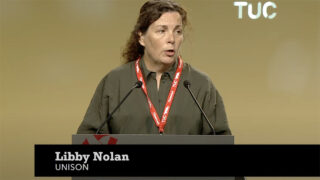New food service start-ups may be unwittingly putting the public at risk, as public sector cuts whittle away environmental health services, UNISON warned today.
The warning comes as respondents in a new survey, carried out as part of The Damage, the union’s far-reaching investigation into the impact of public service budget cuts, revealed the impact of the spike in ‘Great British Bake Off Entrepreneurs’.
Cash-strapped businesses cutting corners, and the frequency with which failing businesses change hands, means that already-stretched environmental health services are being placed under substantial pressure to keep people safe.
Yet the rise of ‘home entrepreneurs’ setting up catering services without the necessary expertise and training has created a food service ‘triple threat’ for environmental health officers, the union said. At the same time, staff shortages mean that preventative work, such as education, is being cut back.
A total of 1,272 jobs have been lost in environmental health services in the UK over the past two years, which has led to a reduction in activity across the board including:
A 15% reduction in enforcement notices issued in 2011/12
A 4% reduction in enforcement visits in 2011/2012
An 8% reduction in scheduled inspections carried out in 2011/12
Heather Wakefield, UNISON head of local government said:
“Our findings show the impact the government’s austerity agenda is having on the ability of environmental health services to keep the public safe.
“It’s not just about enforcement – although our research shows this has dropped significantly – it is about prevention, which our members are telling us is becoming more and more difficult as resources are stretched.
“Members of the public should be commended for setting up businesses and boosting their local economies in these difficult times. But their success depends on environmental health professionals having the resources to support them with provide sound, preventative advice, while still being able to protect the public from harm if things go wrong.
“Cuts to environmental health budgets and staff make a challenging job only harder; if the government wants to see real economic growth, we need proper investment in the public services that exist to help businesses flourish.”
Environmental health spending – per head of population – has dropped substantially. Local authorities spent on average £11.74 per person on environmental health in 2009/10. This figure now stands at an average of £10.81 per person
Environmental health officers’ responses to the survey included:
“Great increase in food businesses starting up and just as quickly closing down. Great demand for initial advice and opening inspections for little long-term benefit. Lots of people trying to start up food businesses from home (mostly cake making!).”
“More new businesses opening by people who do not necessarily have the right skills. A lot of people with redundancy money appear to think that running a food business is easy money. This has resulted in much more time being spent on [giving] advice to businesses that generally don’t last.”
“We will be unable to spend time with businesses helping them comply with regulation and so will become more reliant on formal action such as notices or court action. This has been shown not to secure long term change in businesses behaviour – education achieves that.”
ENDS


